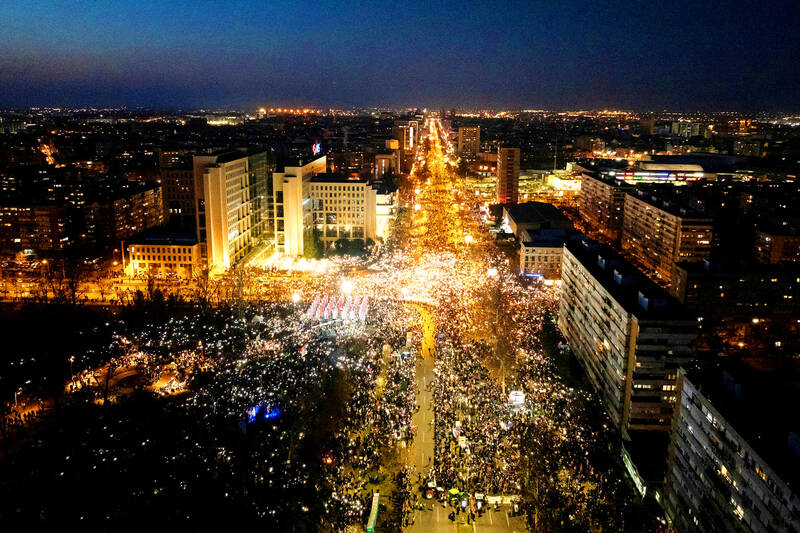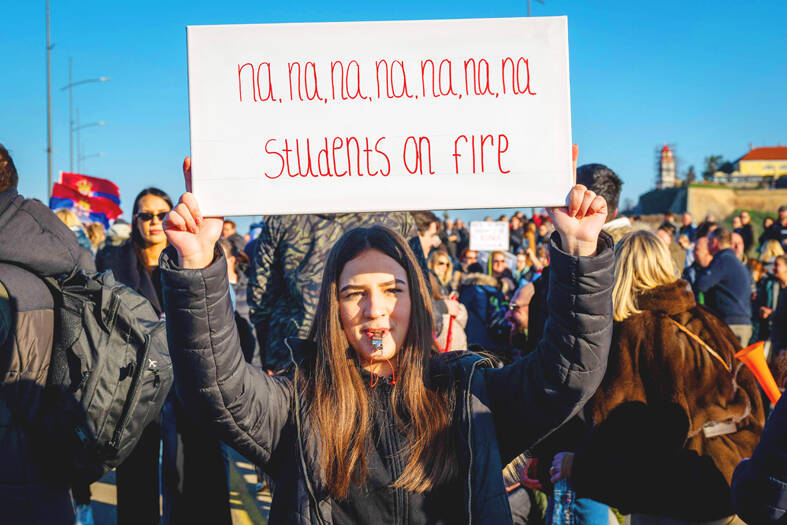Serbia’s students led a mass protest and blocked bridges over the River Danube in the northern city of Novi Sad on Saturday, drawing tens of thousands into the streets to express their anger with the country’s populist leadership and to call for change.
Saturday marked three months since a huge concrete canopy at Novi Sad’s main railway station collapsed, killing 15 people. The crash on Nov. 1 last year sparked a wide anti-corruption movement and months of student-led street protests.
Many in Serbia believe that the collapse was essentially caused by government corruption in a large infrastructure project with Chinese state companies.

Photo: Reuters
Critics believe graft led to a sloppy job during the reconstruction of the Novi Sad train station, poor oversight and disrespect of existing safety regulations. The issue has come to symbolize a wider discontent over the rule of law in Serbia.
Tens of thousands of people converged on Novi Sad for the blockades, dubbed “Three Months — Three Bridges.”
One of the blockades was set to extend until yesterday.

Photo: AFP
As the blockades started, entire bridges and the streets around them were flooded with people, while many more stood on the riverbanks below. Self-appointed student guards had to control the number of people walking on the bridges for security reasons.
“After long time we can feel positive energy in the air, on the streets, among people,” local resident Slavica Nikolic said.
“When I talk to people, it feels like the hope has woken up,” she said. “We remember well some uglier times. This is finally some sort of new hope, that something good is going to happen in this country.”
Roads into the city were clogged with cars ahead of the rally as people tried to reach Novi Sad from Belgrade and other Serbian cities.
Tractors rolled through the city streets as farmers drove in front of three separate student columns heading toward the three bridges and thousands of residents cheered them along the way. Many carried Serbian flags in the crowd or banners reading: “three months” or “We are defending freedom.”
University students have taken a leading role in the protests that have developed into the most serious challenge in years to the country’s powerful populist leader, President Aleksandar Vucic.
Vucic has accused students and other protesters of working for foreign intelligence services to oust him from power, while at the same time offering concessions and talks, and issuing veiled threats by saying that his supporters’ “patience is running out.”
“Today we offer talks and today we offer dialogue,” Vucic said on Saturday. “The second someone thinks that they will use violence to seize power, the state will act like a state, just like everywhere else in the world.”
Persistent demonstrations forced the resignation of Serbian Prime Minister Milos Vucevic last week and various concessions from the populist government, as it seeks to quell growing resistance.
Thousands of people came out on Friday evening to welcome hundreds of students from Belgrade who had walked for two days to join the bridge blockades.
Apart from Novi Sad and Belgrade, daily protests and traffic blockades have been held throughout Serbia, often marred by incidents, including drivers ramming cars into protesters.
One such incident happened in Belgrade on Friday, leaving two women injured after a driver knocked them down.
Along the way on their 80km journey to Novi Sad on Thursday and Friday, the students from Belgrade were greeted by cheering citizens who honked their car horns or came out of their homes to offer food and drinks.
Hundreds more people on bicycles and motorcycles headed separately toward Novi Sad on Friday and Saturday while Belgrade’s taxi drivers said they would come too and give the marchers a lift home yesterday.

‘TERRORIST ATTACK’: The convoy of Brigadier General Hamdi Shukri resulted in the ‘martyrdom of five of our armed forces,’ the Presidential Leadership Council said A blast targeting the convoy of a Saudi Arabian-backed armed group killed five in Yemen’s southern city of Aden and injured the commander of the government-allied unit, officials said on Wednesday. “The treacherous terrorist attack targeting the convoy of Brigadier General Hamdi Shukri, commander of the Second Giants Brigade, resulted in the martyrdom of five of our armed forces heroes and the injury of three others,” Yemen’s Saudi Arabia-backed Presidential Leadership Council said in a statement published by Yemeni news agency Saba. A security source told reporters that a car bomb on the side of the road in the Ja’awla area in

‘SHOCK TACTIC’: The dismissal of Yang mirrors past cases such as Jang Song-thaek, Kim’s uncle, who was executed after being accused of plotting to overthrow his nephew North Korean leader Kim Jong-un has fired his vice premier, compared him to a goat and railed against “incompetent” officials, state media reported yesterday, in a rare and very public broadside against apparatchiks at the opening of a critical factory. Vice Premier Yang Sung-ho was sacked “on the spot,” the state-run Korean Central News Agency said, in a speech in which Kim attacked “irresponsible, rude and incompetent leading officials.” “Please, comrade vice premier, resign by yourself when you can do it on your own before it is too late,” Kim reportedly said. “He is ineligible for an important duty. Put simply, it was

Yemen’s separatist leader has vowed to keep working for an independent state in the country’s south, in his first social media post since he disappeared earlier this month after his group briefly seized swathes of territory. Aidarous al-Zubaidi’s United Arab Emirates (UAE)-backed Southern Transitional Council (STC) forces last month captured two Yemeni provinces in an offensive that was rolled back by Saudi strikes and Riyadh’s allied forces on the ground. Al-Zubaidi then disappeared after he failed to board a flight to Riyadh for talks earlier this month, with Saudi Arabia accusing him of fleeing to Abu Dhabi, while supporters insisted he was

Syrian President Ahmed al-Sharaa on Sunday announced a deal with the chief of Kurdish-led forces that includes a ceasefire, after government troops advanced across Kurdish-held areas of the country’s north and east. Syrian Kurdish leader Mazloum Abdi said he had agreed to the deal to avoid a broader war. He made the decision after deadly clashes in the Syrian city of Raqa on Sunday between Kurdish-led forces and local fighters loyal to Damascus, and fighting this month between the Kurds and government forces. The agreement would also see the Kurdish administration and forces integrate into the state after months of stalled negotiations on